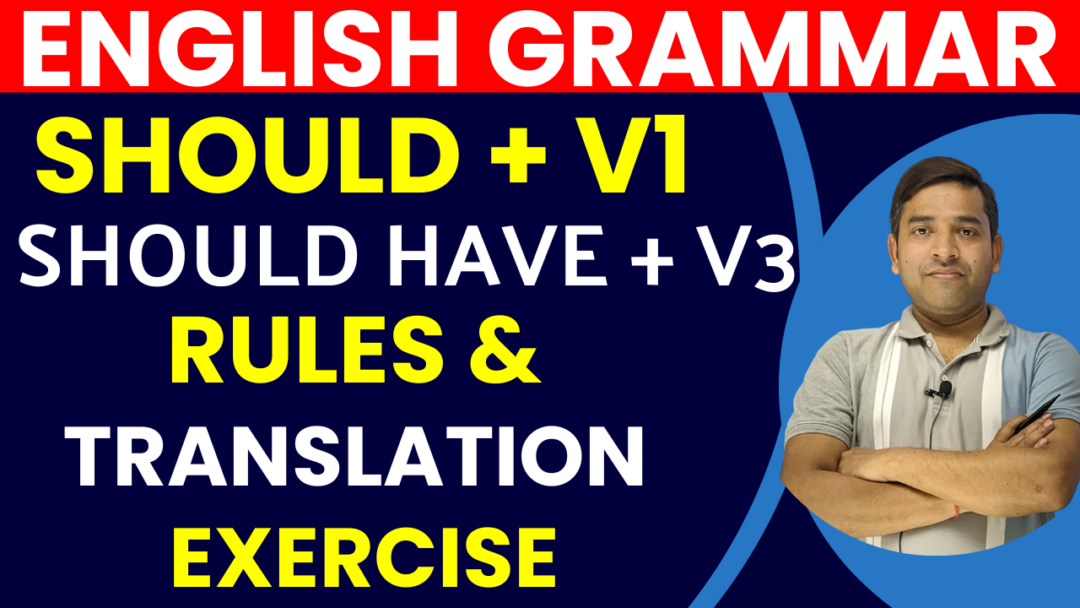![]()
Should + V1 and Should have + V3 Difference
Table of Contents
Should + V1 and Should have + V3 Difference – In this blog post, I am sharing the differences between “Should + V1” and “Should have + V3” in English Grammar, along with Hindi translations and exercises for Hindi medium students who want to learn Spoken English.
English Grammar in Hindi – Should + V1 and Should have + V3 Difference
Here you will Find detailed Rules of Should + V1 and Should have + V3 in English and Hindi
Uses of “Should + V1”
Detailed Explanation of “Subject + Should + V1 + Object”
| Structure: Subject + should + base verb (V1) + object |
This structure is used to give advice, suggestions, recommendations, or to express duty/obligation in a polite manner. “Should” is a modal verb that always takes the base form of the verb (V1) without “to.”
1. Uses of “Should + V1”
(a) Giving Advice or Suggestions: It is commonly used to give advice to someone about what they should do.
Example:
You should drink more water.
तुम्हें अधिक पानी पीना चाहिए।
We should help the poor.
हमें गरीबों की मदद करनी चाहिए।
(b) Expressing Obligation or Duty: It indicates what is right, correct, or proper to do in a situation.
Example:
Students should respect their teachers.
छात्रों को अपने शिक्षकों का सम्मान करना चाहिए।
You should always follow the traffic rules.
तुम्हें हमेशा यातायात के नियमों का पालन करना चाहिए।
(c) Expressing Expectations: It expresses what is expected to happen under normal conditions.
Example:
The train should arrive at 5 PM.
ट्रेन को शाम 5 बजे आ जाना चाहिए।
She should pass the exam if she studies well.
अगर वह अच्छे से पढ़ाई करती है तो उसे परीक्षा में पास होना चाहिए।
2. Formation of Negative Sentences
To make a negative sentence, add not after “should.”
| Structure: Subject + should not + V1 + object |
Examples:
You should not waste your time.
तुम्हें अपना समय बर्बाद नहीं करना चाहिए।
We should not lie to our parents.
हमें अपने माता-पिता से झूठ नहीं बोलना चाहिए।
3. Formation of Questions
To form a question, place “should” before the subject.
| Structure: Should + subject + V1 + object? |
Examples:
Should I call her now?
क्या मुझे उसे अभी कॉल करना चाहिए?
Should we wait for him?
क्या हमें उसका इंतजार करना चाहिए?
4. Common Mistakes to Avoid
(a) Using “to” with Should
Incorrect: You should to study hard.
Correct: You should study hard.
तुम्हें कड़ी मेहनत से पढ़ाई करनी चाहिए।
(b) Using Verb in Other Forms
Incorrect: She should studies every day.
Correct: She should study every day.
उसे हर दिन पढ़ाई करनी चाहिए।
Translation Exercise – Should + V1 and Should have + V3 Difference
1. तुम्हें हर दिन व्यायाम करना चाहिए।
2. हमें दूसरों की मदद करनी चाहिए।
3. उसे अपने माता-पिता की बात माननी चाहिए।
4. आपको समय पर स्कूल पहुंचना चाहिए।
5. बच्चों को मीठा कम खाना चाहिए।
6. हमें हमेशा सच बोलना चाहिए।
7. तुम्हें समय पर सोना चाहिए।
8. छात्रों को अपने शिक्षकों का सम्मान करना चाहिए।
9. हमें पानी की बर्बादी रोकनी चाहिए।
10. उन्हें अपनी जिम्मेदारियों को निभाना चाहिए।
11. आपको एक अच्छा नागरिक बनना चाहिए।
12. हमें हर किसी से दयालुता से पेश आना चाहिए।
13. उसे इस विषय पर ध्यान देना चाहिए।
14. तुम्हें हर दिन अखबार पढ़ना चाहिए।
15. हमें प्रकृति की रक्षा करनी चाहिए।
16. उन्हें अपनी गलतियों को सुधारना चाहिए।
17. तुम्हें अपनी सेहत का ख्याल रखना चाहिए।
18. आपको पढ़ाई के लिए समय निकालना चाहिए।
19. हमें अपने लक्ष्य को प्राथमिकता देनी चाहिए।
20. तुम्हें इस अवसर को गंवाना नहीं चाहिए।
21. बच्चों को हर दिन पढ़ाई करनी चाहिए।
22. हमें अपने पड़ोसियों से मिलनसार रहना चाहिए।
23. तुम्हें समय बर्बाद नहीं करना चाहिए।
24. आपको अपने विचार स्पष्ट रखने चाहिए।
25. हमें अपने काम को समय पर पूरा करना चाहिए।
25 English Translation Exercise with Should + V1 and Should have + V3 Difference
1. You should exercise every day.
2. We should help others.
3. She should listen to her parents.
4. You should reach school on time.
5. Children should eat less sweet.
6. We should always speak the truth.
7. You should sleep on time.
8. Students should respect their teachers.
9. We should stop wasting water.
10. They should fulfill their responsibilities.
11. You should be a good citizen.
12. We should always treat everyone kindly.
13. She should focus on this subject.
14. You should read the newspaper every day.
15. We should protect nature.
16. They should correct their mistakes.
17. You should take care of your health.
18. You should take out time for studying.
19. We should prioritize our goals.
20. You should not miss this opportunity.
21. Children should study every day.
22. We should be friendly with our neighbors.
23. You should not waste time.
24. You should keep your thoughts clear.
25. We should complete our tasks on time.
Uses of “Should Have + V3”
Detailed Explanation of “Subject + Should Have + V3 + Object”
| Structure: Subject + should have + past participle (V3) + object |
This structure is used to express regret, criticism, or to indicate that something was expected or advisable in the past but did not happen. The action was appropriate or necessary, but it was not completed or fulfilled.
1. Rules of using “Should Have + V3”
(a) Expressing Regret or Missed Opportunity: This form is often used to express regret or acknowledge that something should have been done in the past but wasn’t.
Example:
I should have studied harder for the exam.
मुझे परीक्षा के लिए अधिक मेहनत से पढ़ाई करनी चाहिए थी।
She should have apologized to her friend.
उसे अपने दोस्त से माफी मांगनी चाहिए थी।
(b) Criticizing Past Actions: It is used to criticize someone’s action or decision in the past.
Example:
You should have told me the truth.
तुम्हें मुझे सच्चाई बतानी चाहिए थी।
They should have completed the project on time.
उन्हें परियोजना समय पर पूरी करनी चाहिए थी।
(c) Expressing Expectations Not Met: It can also indicate something that was expected to happen in the past but didn’t.
Example:
The train should have arrived by now.
ट्रेन को अब तक आ जाना चाहिए था।
You should have received the package yesterday.
तुम्हें कल पैकेज मिल जाना चाहिए था।
2. Formation of Negative Sentences
To make a negative sentence, add ‘Not’ after “Should.”
| Structure: Subject + should not have + V3 + object |
Examples:
You should not have wasted your time.
तुम्हें अपना समय बर्बाद नहीं करना चाहिए था।
They should not have behaved so rudely.
उन्हें इतना अशिष्ट व्यवहार नहीं करना चाहिए था।
3. Formation of Questions
To form a question, place “should” before the subject.
| Structure: should + Subject + have + V3 + object + ? |
Examples:
Should I have called her earlier?
क्या मुझे उसे पहले कॉल करना चाहिए था?
Should they have invited us to the party?
क्या उन्हें हमें पार्टी में बुलाना चाहिए था?
4. Common Mistakes to Avoid
(a) Using Wrong Verb Forms
Incorrect: You should have went there.
Correct: You should have gone there.
तुम्हें वहां जाना चाहिए था।
(b) Using “to” with Should Have
Incorrect: You should have to completed it.
Correct: You should have completed it.
तुम्हें इसे पूरा करना चाहिए था।
Usage Tips – Should + V1 and Should have + V3 Difference
Use “should have + V3” when talking about what should have been done in the past.
It often conveys regret or criticism about past actions or inactions.
Practice forming both positive and negative sentences to build familiarity with this structure.
Translation Exercises for Practice Should + V1 and Should have + V3 Difference
1. तुम्हें उसकी मदद करनी चाहिए थी।
2. मुझे अपनी किताब लौटानी चाहिए थी।
3. हमें पहले इस मुद्दे को सुलझाना चाहिए था।
4. उसने समय पर खाना खा लेना चाहिए था।
5. मुझे जल्दी घर पहुंच जाना चाहिए था।
6. उन्हें अपने माता-पिता को बताना चाहिए था।
7. हमें अपनी राय स्पष्ट करनी चाहिए थी।
8. तुम्हें अपनी गलती स्वीकार करनी चाहिए थी।
9. मुझे पहले से टिकट बुक कर लेनी चाहिए थी।
10. उसे ईमानदारी से काम करना चाहिए था।
11. हमें उस प्रस्ताव को स्वीकार कर लेना चाहिए था।
12. मुझे अपनी योजना को साझा करना चाहिए था।
13. तुम्हें समय पर जवाब देना चाहिए था।
14. हमें उसकी सलाह सुननी चाहिए थी।
15. उसे सही निर्णय लेना चाहिए था।
16. मुझे इसे नजरअंदाज नहीं करना चाहिए था।
17. हमें अपनी जिम्मेदारी निभानी चाहिए थी।
18. तुम्हें दूसरों की राय का सम्मान करना चाहिए था।
19. उसे परीक्षा की तैयारी करनी चाहिए थी।
20. मुझे उसके प्रति अधिक सहानुभूति रखनी चाहिए थी।
21. हमें समस्या को गंभीरता से लेना चाहिए था।
22. तुम्हें अपनी किताबें व्यवस्थित रखनी चाहिए थी।
23. मुझे उसकी तारीफ करनी चाहिए थी।
24. हमें उसकी मदद स्वीकार कर लेनी चाहिए थी।
25. तुम्हें अपनी भावनाओं को नियंत्रित करना चाहिए था।
25 English Examples of Should + V1 and Should have + V3 Difference
1. You should have helped him.
2. I should have returned my book.
3. We should have resolved this issue earlier.
4. He should have eaten on time.
5. I should have reached home early.
6. They should have told their parents.
7. We should have clarified our opinion.
8. You should have admitted your mistake.
9. I should have booked the tickets in advance.
10. He should have worked honestly.
11. We should have accepted that proposal.
12. I should have shared my plan.
13. You should have replied on time.
14. We should have listened to his advice.
15. He should have made the right decision.
16. I should not have ignored it.
17. We should have fulfilled our responsibility.
18. You should have respected others’ opinions.
19. He should have prepared for the exam.
20. I should have been more sympathetic toward him.
21. We should have taken the problem seriously.
22. You should have kept your books organized.
23. I should have praised him.
24. We should have accepted his help.
25. You should have controlled your emotions.
English Grammar & Vocabulary
100 English Words Every Adult should Know
3000 English Words With Hindi Meaning (Part-9)
English Conversation: Searching for a Job
List of Phobias: Common Phobias From A to Z with Hindi
English Conversation – Talking about Favorite Foods
3000 English Words With Hindi Meaning (Part-8)
Vocabulary Root Words with “Cide” with Hindi
800 Most Common Verbs with Hindi Pdf





